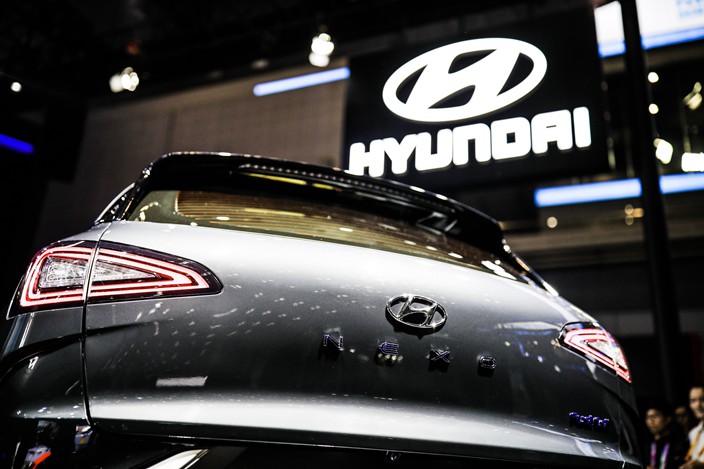Carmakers Shuffle Executives as Industry Faces Declining Sales

* Hyundai Motor Group, Volkswagen AG, Ford Motor Co. have substantially shaken up their respective corporate structures recently
* One analyst says automakers need to cooperate more to help them all “get through this difficult time”
(Beijing) — Major global automakers have shuffled their executive teams amid an overall market downtown and new industry trends such as ride-hailing and electrification, but some analysts argue that this alone is unlikely to reverse the sector’s fortunes.
The latest example is South Korea’s Hyundai Motor Group, which on Wednesday announced a massive shake-up in its ranks, including the appointment of its first foreign head of research and development. This followed the promotion of Chung Eui-sun in September to executive vice chairman, putting him a step closer to succeeding his aging father, 80-year-old Chairman Chung Mong-koo.
Germany’s Volkswagen AG in April appointed a new CEO and enacted a new corporate structure designed to speed up its decision-making process.
“In general, we are seeing more restructuring and new changes of senior executives at the OEMs (original equipment manufacturers) in the past six to 12 months than the previous years,” said Raymond Tsang, an auto analyst with Bain & Co.
This comes as growth of new-vehicle sales slow in some of the world’s leading markets, especially China, where sales are expected to see their first year-on-year decline in 28 years.
Facing the challenge, Ford Motor Co. has crafted a new China business strategy. In October, the U.S.’ No. 2 automaker announced a restructuring that will make its China operations a stand-alone company, reporting directly to its global headquarters.
Anning Chen, who previously worked the Chinese state-owned Chery Automobile Co., was chosen to lead the company in Ford’s second-biggest market by unit sales.
Tsang — who declined to comment on a specific company — said this kind of strategy may help companies deal with bureaucracy in China, where foreign automakers still have to deal with complex joint venture systems with local partners.
Besides dwindling sales, carmakers are bringing in fresh blood as they deal with emerging trends — especially ride-hailing and the shift to electric cars.
“These trends mean that traditional automakers will have to hire new people who have related expertise,” said Li Junhua at Yilanzhong, a Shenzhen-based consultancy.
A total of 17 top Hyundai executives have been reassigned across the group, including the promotion of Chief Innovation Officer Chi Young-jo to president. In October, Hyundai hired Thomas Schemera, a former BMW executive, to lead product planning for new businesses such as electric vehicles and autonomous cars.
“We are seeing more and more executives getting into a more-strategic role from a variety of experiences and backgrounds,” Tsang said.
However, analysts said simply changing personnel or even resorting to layoffs won’t help automakers revive their business, and they have to come up with long-term counter-crisis plans.
“Traditionally, they see each other as ‘foes,’ but they need to change now. They should cooperate more to get through this difficult time,” said Cao Fei, an analyst at Klynveld Peat Marwick Goerdeler, an auditor.
Contact reporter Mo Yelin (yelinmo@caixin.com)

- 1China Officials Dismiss Tax Hike Rumors After Tech Selloff
- 2Cover Story: How Gutter Oil Became a Prized Fuel for International Airlines
- 3Prominent Chinese Journalist Liu Hu Detained by Police in Chengdu
- 4Maersk Unit Takes Over CK Hutchison Panama Ports After Court Ruling
- 5China Provinces Set Cautious 2026 Growth Targets
- 1Power To The People: Pintec Serves A Booming Consumer Class
- 2Largest hotel group in Europe accepts UnionPay
- 3UnionPay mobile QuickPass debuts in Hong Kong
- 4UnionPay International launches premium catering privilege U Dining Collection
- 5UnionPay International’s U Plan has covered over 1600 stores overseas





